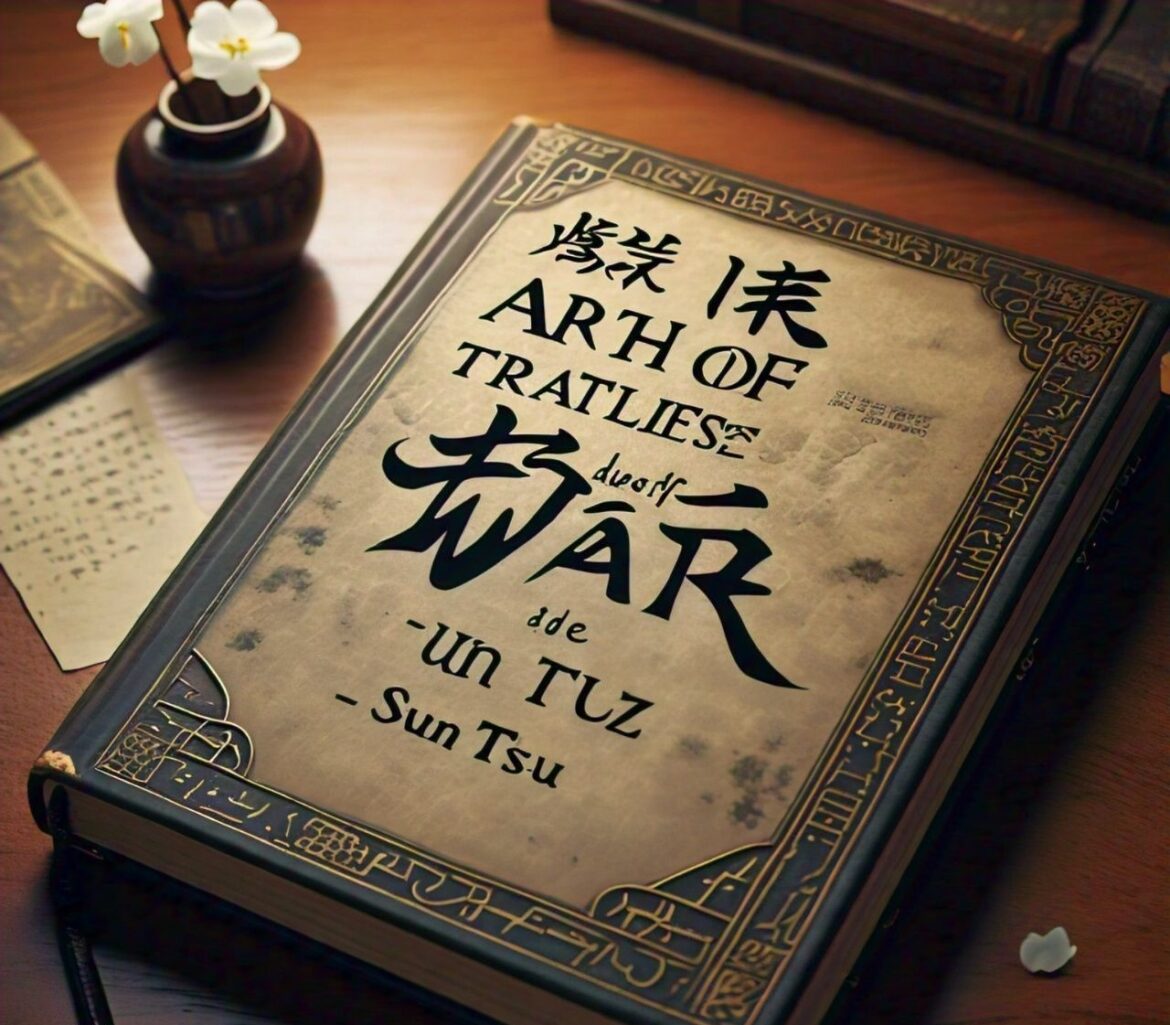Mastering Strategy: Timeless Lessons from Sun Tzu’s The Art of War for Success in Life and Business
| July 23, 2024
The Art of War, attributed to Sun Tzu, is a classic Chinese military treatise dating back to the 5th century BCE. It remains one of the most influential works on strategy, leadership, and conflict management. The treatise is composed of 13 chapters, each focusing on different aspects of warfare and strategy. Here’s a brief summary of the key concepts covered in the text:
1. Laying Plans
In the first chapter of The Art of War, Sun Tzu underscores the significance of meticulous planning and strategic foresight as the foundation for success in warfare. He asserts that victory comes not from chance or brute force but from thorough preparation. This preparation involves a deep understanding of both one’s own strengths and weaknesses and those of the enemy. By analyzing these factors, a commander can craft strategies that enhance their advantages while addressing their vulnerabilities.
Sun Tzu introduces the “five factors” essential to effective planning: moral influence, weather, terrain, command, and doctrine. Moral influence pertains to the unity and morale of the troops and their alignment with the leader’s objectives. Weather and terrain affect tactical decisions and troop movement, making it crucial to anticipate and adapt to these environmental factors. Command reflects the leader’s skill and ability to inspire and direct their forces, while doctrine encompasses the guiding principles and methods for conducting operations.
The interplay of these five factors is central to developing a successful strategy. A commander must continuously assess and adapt to changing circumstances, considering how each factor influences the overall plan. By integrating these elements into a cohesive strategy, a commander can effectively manage resources, exploit the enemy’s weaknesses, and navigate the complexities of warfare, setting the stage for a decisive victory.

2. Waging War
In the second chapter of The Art of War, Sun Tzu explores the costs and logistics of war, emphasizing that prolonged conflict drains both resources and morale. This principle is not limited to warfare; it applies to various aspects of life, such as personal projects, business ventures, or even long-term goals. Just as extended battles can deplete military resources, extended efforts without clear results can exhaust time, energy, and motivation in daily life.
The essence of Sun Tzu’s advice is to manage resources efficiently and achieve goals with minimal waste. In practical terms, this means setting clear objectives, avoiding unnecessary delays, and utilizing resources wisely. By focusing on effective planning and strategic execution, one can avoid burnout and achieve success without the need for protracted struggle.
3. Attack by Stratagem
In the third chapter of The Art of War, Sun Tzu emphasizes the role of deception and cunning strategies in achieving victory. This concept extends beyond the battlefield and is relevant in various aspects of life, such as negotiations, career advancement, and personal relationships. By using strategic unpredictability and keeping opponents or competitors off balance, one can gain an edge and maneuver situations more effectively.
Flexibility and adaptability are key to this approach. Just as Sun Tzu advises being unpredictable in warfare, in life it’s important to stay adaptable and open to changing strategies. This allows for the effective navigation of challenges and the ability to seize opportunities as they arise. By employing strategic thinking and remaining versatile, one can maintain an advantage and achieve desired outcomes with greater efficiency.

4. Tactical Dispositions
In the fourth chapter of The Art of War, Sun Tzu explores the importance of tactical dispositions, which involves effectively positioning oneself and making strategic decisions based on the current situation. This principle can be applied to personal and professional life by understanding the value of positioning and timing. Just as in battle, where knowing when and where to act is crucial, in life, making informed decisions about where to invest your time and energy can lead to greater success and fulfillment.
Effective tactical dispositions in life involve being aware of your environment and adjusting your approach based on changing circumstances. By strategically positioning yourself—whether in a career, personal goals, or relationships—and remaining responsive to shifts in your situation, you can maximize your opportunities and mitigate potential setbacks. This approach ensures that you remain proactive and effective in achieving your objectives, adapting to new challenges as they arise.
5. Energy
In the fifth chapter of The Art of War, Sun Tzu introduces the concept of “energy,” which refers to the effective use of force and momentum to achieve strategic goals. This idea is highly applicable to personal and professional life. Just as in battle, where harnessing and directing energy with precision leads to greater impact, in everyday life, focusing your efforts and resources efficiently can significantly enhance your effectiveness and outcomes.
Managing energy in life involves directing your efforts towards your most important goals with clarity and purpose. By understanding where to invest your time and resources, and avoiding distractions or wasted effort, you can achieve more meaningful progress. This strategic application of energy ensures that you make the most of your capabilities, leading to more impactful results and a more streamlined path to success.

6. Weak Points and Strong
In the sixth chapter of The Art of War, Sun Tzu emphasizes the importance of understanding both your own strengths and weaknesses as well as those of your adversaries. This principle can be applied to various aspects of life, such as career development, personal growth, and competitive situations. By identifying and leveraging your own strengths while addressing your weaknesses, you can position yourself advantageously in any scenario.
Similarly, recognizing and exploiting the vulnerabilities of others—whether in a business negotiation, a personal relationship, or a competitive environment—can give you a strategic edge. At the same time, it’s crucial to protect and mitigate your own weaknesses to maintain resilience and effectiveness. This balanced approach ensures that you are not only aware of your own capabilities but also adept at navigating and capitalizing on the dynamics around you.
7. Maneuvering
In the seventh chapter of The Art of War, Sun Tzu highlights the significance of maneuvering and flexibility in adapting to changing circumstances. This concept is highly relevant to personal and professional life, where the ability to pivot and adjust strategies in response to evolving situations can greatly enhance your effectiveness. Whether navigating career changes, managing projects, or handling personal challenges, being adaptable and responsive can provide a distinct advantage.
Effective maneuvering in life involves staying aware of shifts in your environment and being prepared to alter your approach as needed. By remaining flexible and open to new opportunities or adjustments, you can better position yourself to overcome obstacles and seize advantages. This proactive mindset ensures that you are not rigidly stuck in a single path but are agile enough to respond to the dynamic nature of life’s challenges and opportunities.
8. Variation in Tactics
In the eighth chapter of The Art of War, Sun Tzu underscores the importance of varying tactics rather than sticking rigidly to a single approach. This principle translates effectively into personal and professional settings, where flexibility and adaptability are key to overcoming obstacles and achieving success. Relying on a fixed strategy can lead to predictability and vulnerability, whereas adapting your tactics to suit the evolving circumstances can maintain your initiative and enhance your effectiveness.
In everyday life, this means being open to adjusting your methods and strategies based on the context and feedback you receive. Whether you’re navigating a career path, managing a team, or working towards personal goals, the ability to pivot and modify your approach in response to changing conditions can help you stay ahead and achieve better results. Embracing variation in tactics ensures that you remain agile and responsive, maximizing your chances of success in dynamic environments.

9. Engaging the Force
In the ninth chapter of The Art of War, Sun Tzu explores the principles of engagement, emphasizing the importance of timing and choosing the right conditions for action. This concept is relevant to personal and professional life, where knowing when and how to engage in various activities or challenges is crucial. Just as Sun Tzu advises engaging under favorable conditions and avoiding direct confrontation when it’s not beneficial, in life, it’s important to recognize the right moments to act and when to hold back.
Applying this principle involves evaluating the circumstances and potential outcomes before taking action. Whether in a business negotiation, a career decision, or a personal conflict, assessing the timing and conditions can help you make more strategic choices. By engaging in opportunities when conditions are favorable and avoiding direct confrontations or challenges when they are not advantageous, you can optimize your chances for success and manage risks more effectively.
10. Adaptability
In the tenth chapter of The Art of War, Sun Tzu highlights the critical importance of adaptability and flexibility. He argues that rigid, inflexible plans are less effective compared to strategies that can be adjusted in response to changing circumstances. This principle is highly relevant to everyday life, where the ability to adapt and pivot as situations evolve can be the key to overcoming obstacles and achieving success.
In personal and professional contexts, maintaining flexibility allows you to respond effectively to unforeseen challenges and opportunities. Rather than sticking rigidly to a predefined plan, being open to adjusting your approach based on real-time developments ensures that you remain agile and capable of addressing new information or changes in the environment. This adaptable mindset enhances your ability to navigate complex situations and capitalize on shifting dynamics, leading to more successful outcomes.
11. Strategic Advantage
In the eleventh chapter of The Art of War, Sun Tzu emphasizes the importance of gaining and maintaining a strategic advantage. This involves understanding and leveraging the environment, exploiting the opponent’s mistakes, and positioning oneself effectively to capitalize on opportunities. This principle is directly applicable to personal and professional life, where securing a strategic advantage can significantly enhance your success.
In everyday scenarios, achieving strategic advantage means being aware of your surroundings, recognizing and seizing opportunities, and positioning yourself to make the most of favorable conditions. Whether in career development, competitive situations, or personal goals, understanding the context, leveraging your strengths, and adapting to the situation can give you a competitive edge. By proactively managing these elements, you can optimize your position and enhance your chances of achieving desired outcomes.
12. Employment of Spies
In the twelfth chapter of The Art of War, Sun Tzu addresses the crucial role of espionage and intelligence in gaining a strategic advantage. He highlights that understanding the enemy’s plans and intentions through information gathering can be a decisive factor in achieving victory. Sun Tzu details various types of spies and their specific roles, emphasizing that intelligence is critical for informed decision-making and effective strategy formulation.
In personal and professional life, this principle translates to the importance of gathering and analyzing relevant information to make well-informed decisions. Whether you’re entering a competitive market, navigating complex negotiations, or making strategic career moves, having access to accurate and timely information can provide a significant advantage. By understanding the dynamics of your environment and the positions of others, you can anticipate challenges and opportunities, ultimately positioning yourself for success.

Conclusion
The Art of War transcends its origins as a military manual to offer profound insights into leadership, strategy, and decision-making that are applicable in many areas of life. Sun Tzu’s principles highlight the critical importance of preparation, flexibility, and a deep understanding of both oneself and one’s adversaries. By emphasizing the need for strategic planning, adaptability, and keen awareness of the environment, the treatise provides timeless guidance for navigating complex situations.
Its relevance extends far beyond the battlefield, influencing fields such as business, sports, and personal development. The ability to apply these principles to various contexts demonstrates the enduring impact of Sun Tzu’s work on strategic thinking and effective action. Whether in competitive scenarios or everyday challenges, the insights from The Art of War continue to inform and inspire effective strategies and successful outcomes.


